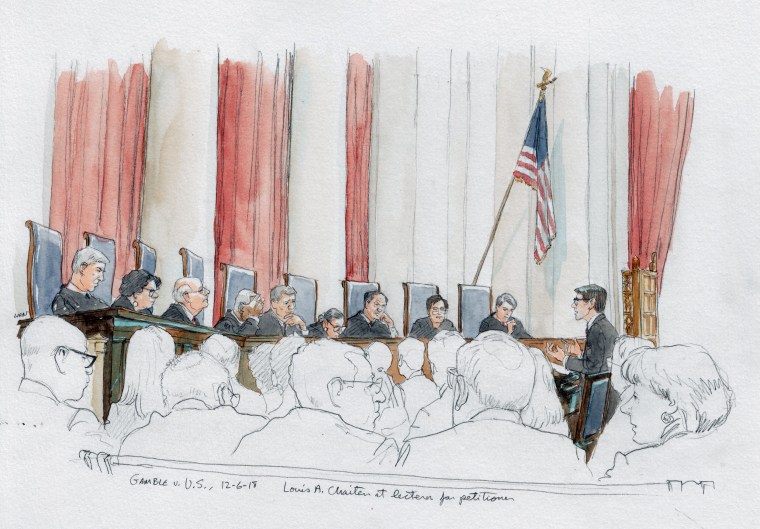WASHINGTON — The Supreme Court declined on Monday to change the longstanding rule that says putting someone on trial more than once for the same crime does not violate the Constitution's protection against double jeopardy — a case that drew attention because of its possible implications for President Donald Trump's former campaign chairman, Paul Manafort.
The 7-2 ruling was a defeat for an Alabama man, Terance Gamble, convicted of robbery in 2008 and pulled over seven years later for a traffic violation. When police found a handgun in his car, he was prosecuted under Alabama's law barring felons from possessing firearms. The local U.S. attorney then charged Gamble with violating a similar federal law. Because of the added federal conviction, his prison sentence was extended by nearly three years.
The Fifth Amendment says no person shall be "twice put in jeopardy of life or limb" for the same offense. But for more than 160 years, the Supreme Court has ruled that being prosecuted once by a state and again in federal court, or the other way around, for the same crime doesn't violate the protection against double jeopardy because the states and the federal government are "separate sovereigns."
The case attracted more than the usual attention because of the prospect that Trump may pardon Manafort, who was sentenced to seven and a half years in prison for violating federal fraud laws. A presidential pardon could free him from federal prison, but it would not protect him from being prosecuted on similar state charges, which were filed by New York. Overturning the rule allowing separate prosecutions for the same offenses would have worked in Manafort's favor.
Gamble's lawyer, Louis Chaiten of Cleveland, said the nation's founders understood the protection against double jeopardy to ban any second prosecution for the same offense. Under English common law, the roots of American law, there was no "separate sovereigns" exception. A person could not be put on trial in England if already tried for the same offense in another country.
Chaiten also argued that the states and the federal government are not truly independent anyway and are instead part of a complete national system. He quoted Alexander Hamilton, who described them as "kindred systems, part of one whole."
And Chaiten said Congress has made the problem worse by dramatically expanding the number and scope of federal laws in recent years, creating more duplication with state laws — something never envisioned in earlier court decisions that allowed double prosecutions.
But the Trump administration said the longstanding double jeopardy rule allows states and the federal government to pursue distinct interests without interfering with each other. Changing the current understanding by barring subsequent prosecutions would allow foreign court actions to preclude U.S. trials for crimes against Americans, the government said.
Civil liberties groups also said the rule has allowed the federal government to pursue notorious civil rights violations that states were unwilling or unable to pursue.
Gamble's argument appealed to some of the court's liberals and conservatives. Two years ago, conservative Justice Clarence Thomas joined liberal Justice Ruth Bader Ginsburg in saying that the court's past double jeopardy rulings were due for a "fresh examination."

